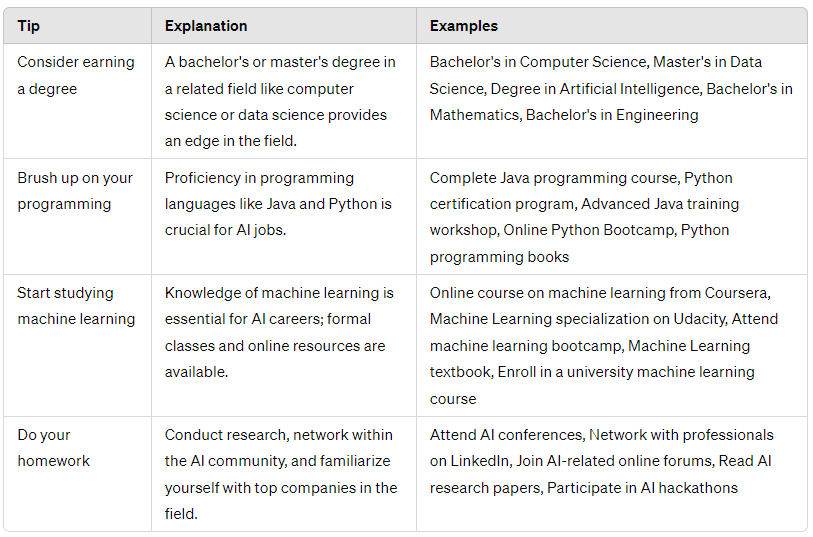When a tech phenomenon makes a splash in the professional world to the extent artificial intelligence (AI) has over the past couple of years, it only makes sense that a lot will change as a result. This is especially the case when it comes to jobs.
Naturally, some jobs will cease to exist, while others will evolve into something new. However, various new jobs will also be created, or they will transform from little-known niche options to highly sought-after professional opportunities. This is already starting to happen within the AI sector.
But how does someone interested in artificial intelligence break into the field? What special training would you need, and can you start without experience?
Here, we’ll explore everything an AI newcomer needs to know about getting a job in artificial intelligence that will take them places.
What Recruiters and Businesses Are Looking For in an AI Professional
According to Statista, the global market for artificial intelligence is expected to grow at an ongoing rate of 10 to 20 percent from now to 2030, so it’s possible to make a career in AI. However, an interest in AI isn’t enough to qualify you for the best positions.
Most businesses prefer applicants with at least bachelor’s degrees in fields like computer science, mathematics, physics, or engineering. If you’re looking for a highly specialized role, a master’s or doctorate is preferred. Ideal candidates will also have one to three years of work experience in machine learning or AI technology.
Skills and qualifications
Here’s a closer look at some hard and soft skills employers seek.
Hard skills and official qualifications include (but may not be limited to):
- Programming proficiency in key languages like Python, Java, and R.
- Experience using machine learning frameworks such as PyTorch or SQL
- Proficiency in data manipulation and associated analytical tools
- A working understanding of algorithms and related AI concepts
- Experience related to software development and knowledge of tools like GitHub or Jupyter Notebook
The following soft skills will make someone a valuable candidate:
- Near-flawless attention to detail
- Passion for problem-solving and being comfortable working with raw data
- Excellent communication skills, both written and verbal
- The ability to work well with others and contribute to the team’s efforts
- A knack for analytical thinking
It’s also crucial to stay on top of emerging trends in the field, as AI is constantly changing. Continuous learning is key before and after you land your first AI job, so develop your learning habit now.
Are Artificial Intelligence Jobs in Demand?
According to the U.S. Bureau of Labor Statistics, opportunities related to information research, machine learning, and similar fields are expected to grow by as much as 23 percent by 2032. Additional data from multiple sources (such as Indeed, The Wall Street Journal, and the University of Maryland, to name just three) further suggests that demand for jobs in the AI field is climbing steadily.
So, yes, AI jobs are in demand. There are also opportunities in various related fields, including robotics, face recognition software, AI in marketing, search engines, gaming, and speech recognition. Some individual high-paying AI jobs to consider include titles like:
- Machine learning engineer
- Data engineer
- AI engineer
- Data scientist
- Robotics engineer
- Software engineer
- AI product manager
- AI marketing consultant
How Can I Start a Career in Artificial Intelligence?
It’s important to understand that breaking into the field requires time, effort, and commitment. Here are some tips on how to get started.

How Do I Start an AI Career with No Experience?
Every professional needs to start somewhere, so don’t sweat it if you don’t have AI experience yet. Try the following strategies to improve your skills.
Teach yourself the basics
The Internet is filled with helpful resources to educate yourself on any topic, including AI basics and the practical details of how modern businesses use it. Here are a few to start:
- How Rock Content Uses AI: A brief overview of how we use artificial intelligence here at Rock Content and key information on what AI can and can’t do. You will also find an overview of various AI content tools.
- The Role of AI in Marketing: This comprehensive video serves as a quick-start guide to how AI intersects with digital-age marketing, its role moving forward, etc.
- Google AI for Anyone: Google’s free, self-led four-week course on artificial intelligence, how it works, and practical applications for the techs.
- IBM’s AI Foundations for Everyone: This IBM-backed Coursera specialization includes three AI-focused courses. It’s not free, but financial aid options are available.
- How to Boost Content Production with AI: This comprehensive offering from our YouTube channel covers more key information about how modern businesses use AI to support ongoing content production.
Gain experience however you can
If you’re serious about pursuing potential careers in AI, it’s important to start building experience as soon as possible. Enter AI contests, get involved in open-source projects, and look into potential opportunities like internships, boot camps, or volunteer positions. All are excellent ways to build a portfolio you can grow over time.
Consider pursuing a certification
Even if a full-scale degree isn’t in the cards right now, pursuing a certification in artificial intelligence or a related field will be helpful. Think programming languages like Python and related skills.
Network, network, network
Getting to know others in the field is necessary if you’re interested in diving in yourself someday. Use social media platforms like LinkedIn to meet other professionals and AI enthusiasts, as well as research top companies in the industry.
Is It Hard to Get into Artificial Intelligence?
When you’re brand new to AI and the idea of pursuing it as a career, it’s only natural to be a bit intimidated. However, it’s important to realize that it’s not a difficult field to break into. You just need the right training and experience—especially in computer science, math, and coding—so work on acquiring that before pursuing a career position.
The following are some additional misconceptions about pursuing AI as a career option. How many do you still believe?
- “You have to be a tech expert to work in AI.” AI covers a lot of ground, so you don’t have to be a tech genius to work in it.
- “Working in AI means working for huge companies.” While AI employers include enterprises and giant corporations, small businesses and startups are definitely part of the conversation.
- “AI is a recent technology.” AI has been around for decades, although it’s certainly going through a boom.
- “AI is going to take everyone’s job.” Like all technological advances, AI will potentially replace or change some positions. However, it’s also creating many others, making it a great professional opportunity to consider.
How to Get a Job in Artificial Intelligence FAQs
Do you still have questions about how to get a job in artificial intelligence? The following FAQs provide additional information.
Do you need an advanced degree to go into AI?
You don’t need a master’s or doctorate to break into AI (although they can be helpful). However, most top companies expect you to have at least a bachelor’s degree or relevant work experience.
What are some AI subfields to consider?
AI as a field covers a lot of ground, so there are many subfields to look into. They include but are not limited to robotics, natural language processing, and computer vision.
What are the benefits of working in AI?
The biggest benefit of choosing AI as a potential career field is the wealth of opportunities it offers. However, it also offers professionals access to stimulating work, high salaries, and job security.
What is the best way to prepare for a career in AI?
Learn everything you can about the field and related subjects like computer science and programming. Stay up to date on emerging industry news and developments, and gain hands-on experience wherever possible.
Ultimately, making a great career choice is all about selecting something fulfilling and secure that you’re passionate about, and AI is an incredible option for tech-savvy individuals. It’s also an opportunity to be part of an exciting emerging future for numerous industries.
Don’t miss out on the latest marketing trends and insights. Subscribe to Rock Content’s blog today!







